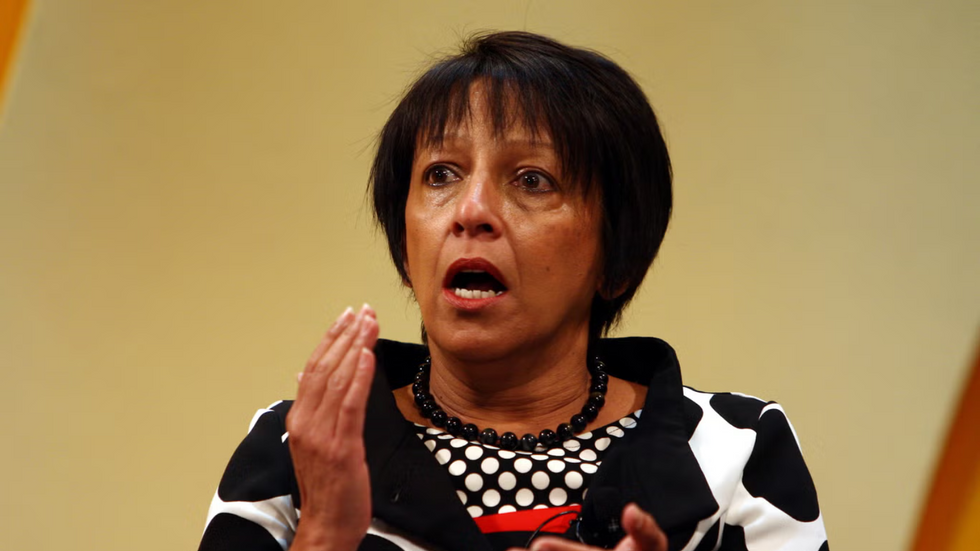WATCH: NHS nurses left in 'legal wrangle' after suing hospital for sexual discrimination after allowing trans colleague into female changins rooms
GB NEWS
Legal experts have warned the trust is in 'continual breach of legal obligations to provide single-sex changing facilities'
Don't Miss
Most Read
An NHS trust which allowed a trans doctor to use a female-only hospital changing room could now face "enforcement action" to protect women's spaces, a watchdog has warned.
NHS Fife has told equalities watchdog the Equality and Human Rights Commission (EHRC) that it would not consider altering its trans policies until after the conclusion of a landmark employment tribunal.
The case involves nurse Sandie Peggie, who challenged a trans doctor's presence in female facilities at Victoria Hospital in Kirkcaldy.
Baroness Kishwer Falkner, the EHRC chairwoman, wrote to NHS Fife after Peggie was accused of misconduct for challenging Dr Beth Upton's presence in female facilities.

Baroness Kishwer Falkner, the EHRC chairwoman, wrote to NHS Fife after Peggie was accused of misconduct
PA
Dr Upton was born male but identifies as a woman.
The EHRC then "reminded" NHS Fife of its obligations regarding single-sex spaces under the Workplace Regulations 1992.
These regulations state that changing rooms are not suitable "unless they include separate facilities for, or separate use of facilities by, men and women where necessary for reasons of propriety".
Carol Potter, NHS Fife's chief executive, said any recommendations from the ongoing tribunal case would be considered "in partnership" with the Scottish Government and trade unions.
In a letter to the EHRC's chief executive, Potter insisted the board's "policies and practices align with our legal duties and our values".
MORE AS TRANS ROWS GRIP BRITAIN'S NHS:
- NHS covers 1,000 trans chest surgery patients every year as alarm bells raised about taxpayers funding 'cruelty for parents'
- NHS warned not use 'midwife' as use of word could 'upset' transgender people
- NHS guide blasted as 'nonsensical' after staff told to treat trans colleagues with beards 'as women' if they identify as female
 Dr Beth Upton arrives at an employment tribunal at Caledonian House, in DundeePA
Dr Beth Upton arrives at an employment tribunal at Caledonian House, in DundeePAThe Telegraph revealed that NHS Fife only replied to the commission after the watchdog was forced to ask twice for information about the health board's policies.
Michael Foran, a gender law expert from the University of Glasgow, warned that the board's decision could expose it "to additional claims of unlawful discrimination from other employees".
He stated that NHS Fife's current practice represents "a continual breach of legal obligations to provide single-sex changing facilities".
The trust's board also failed to respond to the commission's request to see its equality impact assessment of the policy.
It has been reported that NHS Fife had never conducted such an assessment.
In her reply, Potter said NHS Fife recognised its obligations under the Equality Act 2010 and was "committed to fostering a safe, inclusive, and non-discriminatory environment for all staff and patients".

Sandie Peggie (pictured) challenged Dr Beth Upton's presence in female facilities at Victoria Hospital in Kirkcaldy
PA
She wrote: "We currently believe it is important to allow the legal process to reach its conclusion before considering further actions regarding NHS Fife practices."
Potter noted that NHS Scotland is drawing up guidance which "will be accompanied by a comprehensive Equality Impact Assessment".
However, she did not mention whether any assessment had been conducted for the board's existing policy.
Maya Forstater, chief executive of Sex Matters, said NHS Fife's response was "an attempt to deflect criticism".
She said: "It gives the impression of an NHS board that has calculated it's safer to cling to legally shaky policies motivated by trans ideology than to admit and fix its failure to provide single-sex toilets and changing rooms, as it's legally required to do."
An NHS Fife spokesman referred to its letter to the ECHR when asked about policy changes.













